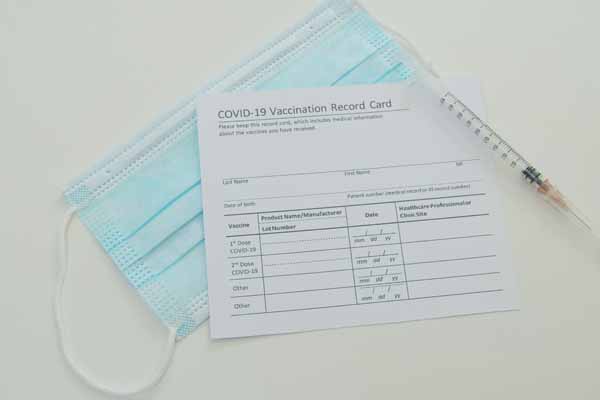
Editor’s note: This blog was originally published in The Lufkin Daily News. Commentaries published in Texas Medicine Today do not necessarily reflect the official policy of the Texas Medical Association.
Like it or not, vaccination passports are coming.
Before we go too far, let’s be clear: The federal government has no plan – and really no ability, at this point – to mandate, create, and verify a nationwide passport confirming anyone’s vaccination status. Though privacy issues are cited as the main reason, the more practical reason is that the U.S. (unlike other countries) does not have a national health care system that is responsible for registering people for and administering COVID-19 vaccinations. In other words, the federal government doesn’t know who has been vaccinated.
A vaccine passport is really nothing more than proof of COVID-19 vaccination. Many businesses, organizations, and even countries are starting to require proof of vaccination as a form of pay to play. Honestly, that is nothing new.
In 1986, I journeyed to rural Thailand to work in a Baptist mission hospital for two months. I was required to get a yellow fever vaccination and carry proof of vaccination with me – a yellow fever vaccine passport, if you will – in order to travel. In 2021, for those ready to visit European Union countries, tourists from “safe” countries will be allowed in – as long as they can show proof of vaccination against COVID-19. Greece is open. France, Spain, Germany, Italy, and Croatia, among other countries, are opening up again soon or have already opened up. Proof of vaccination is the surefire ticket, though entry with a recent negative COVID-19 test or proof of recovery from COVID-19 in the past six months may be possible in some circumstances.
Educational institutions are looking closely at vaccination requirements as well. My alma mater, Rice University in Houston, recently announced that all members of the Rice community are expected to return in person for the fall semester and all students who come to campus are expected to be fully vaccinated before school starts. The list of colleges and universities following suit grows daily. This really shouldn’t surprise anyone. Colleges have required vaccination against infectious diseases like meningitis, measles, mumps, and rubella for years. Why not against COVID-19 in the middle of a pandemic? The U.S. Supreme Court affirmed compulsory vaccination laws way back in 1905 and specifically affirmed proof of vaccination laws for public schoolchildren in 1922, both cases dealing with smallpox.
Texas Gov. Greg Abbott issued an executive order on April 6, “prohibiting state agencies or political subdivisions in Texas from creating a `vaccine passport’ requirement, or otherwise conditioning receipt of services on an individual’s COVID-19 vaccination status.” The order also prohibits organizations that receive public funds from requiring proof of vaccination “in order to receive any service or enter any place.” Governor Abbott’s executive order trying to prohibit vaccine passports is only effective as long as vaccines are administered under an emergency use authorization (EUA), and it excludes nursing homes, state supported living centers, assisted living facilities, and long-term care facilities.
The question of whether colleges, businesses – anyone – can require COVID-19 vaccination when the vaccines are under EUA status is quickly becoming irrelevant. First, Pfizer is applying for full Food and Drug Administration approval of the Pfizer-BioNTech COVID-19 vaccine. Moderna plans to do the same. Both vaccines are highly effective and safe. Second, the Equal Employment Opportunity Commission (EEOC) announced on May 29 that U.S. companies can mandate that employees in a workplace must be vaccinated against COVID-19. The Houston Methodist Hospital System, one of the most respected health care systems in the world, has mandated their employees get vaccinated or face termination. Ninety-nine percent of their 26,000 employees have been vaccinated, but 117 staff are suing. Based on the aforementioned legal precedent and the EEOC pronouncement, the suit should get thrown out.
Short of mandates, employers can choose to offer incentives to employees to get vaccinated. Dollar General, for example, offers employees an extra four hours of pay if they get vaccinated. Incentives extend to the general public as well. By now, most have heard of the Krispy Kreme reward, where those who can show proof of vaccination can get one free glazed donut a day. My waistline is glad there is no Krispy Kreme store near me. Vaccination incentives, from donuts to lottery tickets to permission to attend in-person, live events, or even raising health insurance premiums for those not vaccinated, are mentioned favorably in respected medical publications like the New England Journal of Medicine. PEOPLE Magazine even came out with an article on how to get promotions, prizes, and freebies with a COVID-19 vaccine card.
Ultimately, the goal is to encourage those who may be sitting on the fence to go ahead and get vaccinated. Some diehards may bristle at the thought of vaccine passports and being required to get vaccinated. They would do well to remember that rights have limitations and choices have consequences. Those opposing vaccination must ask themselves if it is really worth not being able to fully participate in an open economy, much less risk losing their job, just to forgo a highly safe and effective jab. Between mandates and incentives, not to mention basic moral and civic duty, refusing COVID-19 vaccination is an increasingly senseless and expensive hill to die on. As for me, I’ve got my passports – the official one and the COVID-19 card – and am ready to travel again!
Sidney Roberts, MD, is a radiation oncologist at the Temple Cancer Center in Lufkin. References available here.